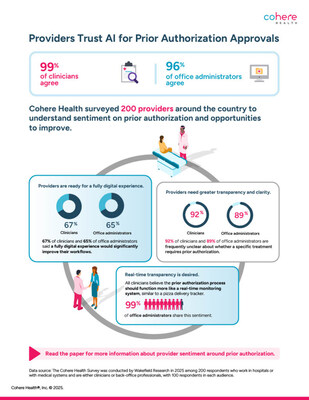Survey from Cohere Health finds overwhelming support for AI and digital-first solutions to ease administrative burden and speed patient access to care
BOSTON, Oct. 7, 2025 /PRNewswire/ — Cohere Health®, the leader in clinical intelligence for health plans and risk-bearing providers, today released findings from its 2025 National Provider Survey on Prior Authorization. The research, which included 200 U.S. clinicians and office administrators, found nearly universal trust in using artificial intelligence (AI) for prior authorization (PA) approvals, with 99% of clinicians and 96% of office administrators reporting confidence in AI-driven PA. This broad endorsement signals the growing demand for digital innovation to reduce provider burden, improve patient care access, and transform PA.
The survey also highlights what’s at stake if legacy systems remain unchanged:
97% of administrators and 93% of clinicians have seen PA delays cause avoidable emergency care or hospitalizations.
55% have witnessed patients abandon treatment because of PA delays.
95% of administrators and 92% of clinicians said the PA process is a burden, with one in ten clinicians linking it to burnout.
“Providers are speaking loud and clear: they want and deserve a prior authorization process that is smarter, simpler, and more transparent,” said Dr. Brian Covino, chief medical officer of Cohere Health. “Our responsible, clinically trained and patient-centric AI doesn’t replace clinical judgment–it strengthens it. By helping health plans and providers better collaborate on timely, consistent, and appropriate decisions, we reduce administrative burden, safeguard patient care, and promote equity across the system.”
Modernization emerged as a clear priority in the survey results. Two-thirds of respondents said a fully digital PA experience would significantly improve their workflows, and nearly all agreed the process should include real-time tracking, providing visibility into where a care request stands at any point. Combined with overwhelming trust in AI, these findings highlight a strong opportunity for health plans to streamline PA with clinical-grade AI, making the process more efficient and responsive to providers’ needs.
The survey also found that outdated processes continue to disrupt care delivery. Only 16% of office administrators and 24% of clinicians use electronic PA platforms for more than 40% of submissions, and about a quarter of requests are still submitted via fax or phone. Many providers also remain unclear about health plan requirements; 92% of clinicians and 89% of administrators said they are frequently unsure if a treatment even requires authorization.

